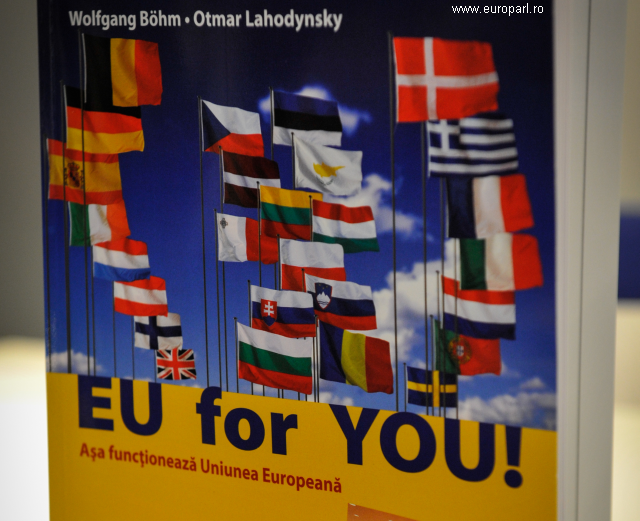EU for YOU! That’s How the EU Works
EU for YOU! That's How the EU Works is an educational project run by the European Parliament jointly with the EC.
Warning: Trying to access array offset on null in /home/web/rri.ro/public/wp-content/themes/rri/template-parts/content.php on line 53

Warning: Trying to access array offset on null in /home/web/rri.ro/public/wp-content/themes/rri/template-parts/content.php on line 98
România Internațional,
16.07.2014, 12:54
Romania joined the EU seven years ago. After a period of weighing the pros and cons of the accession, we have now reached a moment when the country’s EU membership must be consolidated, by making people more aware of what the European citizenship entails. Apart from clearly focusing on justice, economy or domestic affairs, EU membership issues mainly deal with the citizens’ rights and obligations.
“EU for YOU! That’s How the EU Works!” is an educational project that has caught our attention recently. Roxana Morea is a press officer with the European Commission Representation in Bucharest. She told us more about the project.
“The project was run by the European Parliament jointly with the European Commission Representation, in 41 schools, and it presented European information, which was used in history and social science classes. Earlier this year a report on the pilot stage was compiled, and right now a general report on the entire project is in progress, including recommendations on whether it is important or not for the project to continue. In principle, the stakeholders are interested in carrying on the project.”
Last year, the European Parliament’s Information Desk in Romania edited the volume: “EU for YOU! That’s How the EU works!” a supporting teaching material tailored for secondary school pupils, which it then forwarded to the National Education Ministry, for testing. The volume was used for history and social sciences, in 41 schools, targeting 1,360 pupils in Bucharest and the counties of Brasov, Neamt and Suceava, during the first semester of the 2013-2014 school year. In January, specialized institutions assessed the outcome of the project, highlighting that the textbook ” EU for YOU! That’ s How the EU Works!” was an excellent support for the teaching process for optional subjects related to History and Social sciences. The textbook offered comprehensible information for all pupils, regarding the way EU institutions work. As a result, the continuation of the project was recommended, so that the teaching staff could be provided with a fresh set of resources for both content-based and skills-based activities, focusing on the European citizenship.
But why are such projects useful and what is their envisaged outcome? With details on that, here is again Roxana Morea, from the European Commission Representation in Bucharest.
“The EU for YOU projects are part of a large-scale effort of the European institutions to strike up direct dialogues with citizens. One of the EU’s major values is the belief in democracy and the rule of law. The project “EU for YOU” was run in various member states, and in some of them it received financing from the European Social Fund, in others from the resources of the member state Representation or the European Parliament’s Information Desks. All these projects have the dialogue with citizens as their main goal. The eventual aim was an increase in public participation in the debates focusing on citizens’ rights and social inclusion across Europe, the dialogue between European institutions and the citizens of that state.“
We asked Roxana Morea how Romanians perceive their membership to the EU, and how much they know about how the European institutions work.
“Romanians see EU citizenship as a positive thing. They still trust the European institutions and the EU as a whole, and they believe the future of the Union looks good. Unfortunately, in terms of how much they know about European institutions and how they operate, the percentage is rather low. Only 21% of the respondents said they were well informed about the European construction. However, this is not a reason to dismiss the idea that Romanians support the EU and its future.”
The project “EU for YOU! This is how the EU Works!” is to be extended and implemented at national level. Roxana Morea told us what she hopes the project will achieve.
“The aim of these information activities, targeting the European citizens in general and the Romanian ones in particular, is to increase the percentage of those who believe they are well informed. Usually, if students learn about European issues and they understand what is happening, they will later get actively involved in the European construction and will inform the young people around them about what that means.”
Such activities are very important for civil society to understand the role of the European institutions and of the European citizens, such as the right of the latter to participate in direct talks with other citizens. The ultimate goal of the project is to enhance public participation in the debate on citizens’ rights and social inclusion in Europe.






























